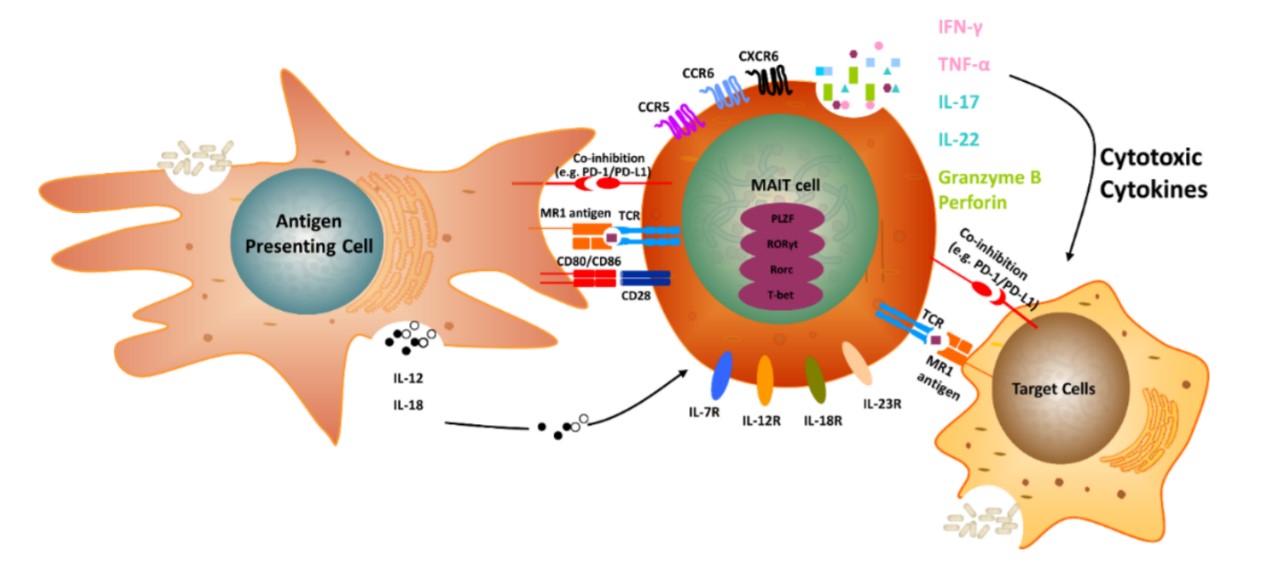

MR1 Tetramer Products
Equipped with state-of-the-art facilities and experienced immunology experts, Creative Biolabs is dedicated to provide a series of MR1 tetramer related products and services to facilitate your project success.
MR1 Introduction
Originally, MR1 was described in the presentation of bacteria antigens to mucosal-associated invariant T (MAIT) cells. MR1 is a ubiquitously expressed non-polymorphic MHC class I-like molecule that is conserved across species and human. MR1 can form tetramer complexes with β2-microglobulin (β2M), which is an 11.8-kD protein interacting and stabilizing MR1. Studies have been showed that the combination with β2M is crucial for MR1 plasma membrane expression and for MR1-antigens binding.
The Biology of MR1 in MAIT Cells
Studies have been showed that MAIT cells are activated by MR1 in complex with metabolites produced by bacteria and fungi of the human microbiome, especially the gut microbiota. In addition, they can mount an immune response against tumor antigens.
 Fig.1 Activation of MAIT cell.1
Fig.1 Activation of MAIT cell.1
Initially, the mature MR1 monomer is situated in intracellular membranes and available to sense metabolic changes. When the appropriate metabolite binds to MR1 together with β2M, the MR1-β2M-antigen complex passes to the plasma membrane or translocates into endosomes. And those metabolites can fold MR1 tetramers, and be capable of activating MAIT cells.
Under activation, MAIT cells could secrete several Th1/Th17 cytokines, such as IFN-γ, TNF-α, IL-17, and IL-22, and cytolytic enzymes, such as granzyme B, and perforin. Which cytokines and enzymes will contribute to kill infected cells and recruit other immune cells to mediate immune responses.
Supported by in-house scientists and first-in-class technological platform, Creative Biolabs is confident in provide MR1 tetramer products and services and guarantee providing MR1 tetramer of high quality to meet demands.
Reference
- Flores-Villanueva, Pedro, et al. "MR1-restricted T cells in cancer immunotherapy." Cancers 12.8 (2020): 2145. Distributed under Open Access license CC BY 4.0, without modification.
- APC-Human MR1 Tetramer - Empty (MHC-YF804)
-
- Class: Class I
- Conjugate: APC
- APC-Human MR1 Tetramer - 5-OP-RU (MHC-YF802)
-
- Class: Class I
- Antigen: 5-OP-RU
- Conjugate: APC
- PE-Human MR1 Tetramer - Empty (MHC-YF801)
-
- Class: Class I
- Conjugate: PE
- PE-Human MR1 Tetramer - 5-OP-RU (MHC-YF799)
-
- Class: Class I
- Antigen: 5-OP-RU
- Conjugate: PE
Our customer service representatives are available 24 hours a day, from Monday to Sunday. Contact Us
Can't find the products you're looking for? Try to filter in the left sidebar.Filter By Tag
For Research Use Only. Not For Clinical Use.



